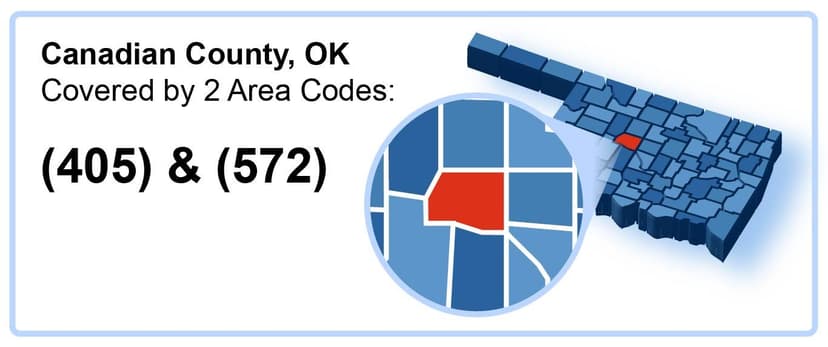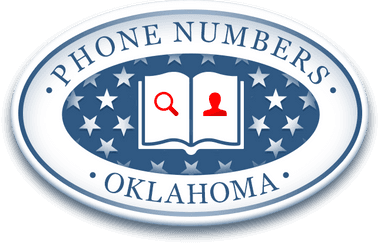What are Canadian County Area Codes?

The North American Numbering Plan (NANP) divides states into Numbering Plan Areas (NPA) known as area codes. Area codes are three-digit prefix telephone numbers assigned to telephone numbers in North America. The Oklahoma Corporation Commission is responsible for the maintenance of area codes in the State of Oklahoma. There are two area codes in Canadian County.
Area Code 405
Area code 405 started operating in 1947. It was one of the original area codes that covered the entire state. In 1997, area code 405 was reduced to cover only central Oklahoma, while the southern and western portions of the old 405 became area code 580. Area code 405 currently covers some of the following cities- Stillwater, Norman, Moore, and Tuttle.
Area Code 572
Area code 572 was approved by the Oklahoma Corporation Commission in 2017. It serves as an overlay for area code 405. The introduction of area code 572 made ten-digit dialing mandatory in central Oklahoma. The Oklahoma Corporation Commission will begin assigning area code 572 from May 24, 2021. Cities within area code 572 include Bethany, Edmond, Del City, and Shawnee.
What are the Best Cell Phone Plans in Canadian County?
As shown by a 2018 National Center of Health Statistics Survey, 66.7% of the Oklahoma adult population used only wireless telephone services, while 3.6% of the adult population used only landlines as their preferred telephone services. According to the same survey, 75.7% of the Oklahoma minors population used wireless telephone services only, while 1.2% of the minors used landlines only. Consequently, the survey showed that residents of the Canadian County prefer wireless telephone services over landlines.
In Canadian County, there are many cell phone plans. However, four major cell phone plans have reasonably good coverage in the county. These include AT&T, T-Mobile, Verizon, and Sprint. AT&T has the highest cellular coverage in the Canadian County, with about 98.5%. T-Mobile follows closely with about 95% coverage, and Verizon comes third with about 80% cellular coverage. Lastly, Sprint has about 67% coverage.
VoIP is another telephony service that Canadian County residents prefer. VoIP (Voice over Internet Protocol) transmits data over high-speed internet connections. VoIP is unique for its flexibility and cost-saving features. These distinctive features of VoIP explain why residents of Canadian County, especially businesses, prefer it to landlines.
Mobile Virtual Network Operators (MVNOs) operate in Canadian County and also provide VoIP services to residents of Canadian County. Examples of MVNOs in Canadian County are Affinity cellular, Altice Mobile, Cricket Wireless, and DataJack.
What are Canadian County Phone Scams?
Canadian County phone scams involve the fraudulent use of telecommunication services by scammers to steal money or personal information from residents. Typically, scammers either use the details obtained from victims to commit identity theft or devise tactics to steal money. Phone scams are initiated through phone calls from persons hiding behind the identities of legitimate government agencies or businesses. Therefore, residents of the county must be careful not to become victims of phone scams.
What are Canadian County Grandparents Scams?
This scam is most common among elderly residents. Here, Canadian County elderly residents receive unsolicited calls from scammers who pretend to be family members or close family friends needing money for emergency purposes. They will ask that the money be sent by iTunes cards or wire transfer. Residents pay money believing that their loved ones would be bailed out from trouble.
Canadian County residents must be wary of any callers claiming to be their family members and requesting funds. Residents must hang up such calls immediately. They can also use free reverse phone number search to reveal the identities of such callers. It is advisable to check with family members to confirm if they are actually in trouble before sending any money.
What are Canadian County Impersonation Scams?
There are many variations of Canadian County impersonation scams. Impersonation scams occur when scammers take up the identities of government agencies or trusted legitimate businesses to defraud residents of their money. It also involves stealing personal or financial information with the intent to commit identity theft. In impersonation scams, scammers mostly use call spoofing to make their calls look genuine and convincing to unsuspecting residents. A key to identifying these scammers is their requests for card payments or money transfers.
To identify impersonation scams, residents of Canadian County may use free reverse phone lookup services. Additionally, residents should never give sensitive personal information to unsolicited callers. Residents should hang up calls from unknown callers immediately. Lastly, residents who are victims of impersonation scams should file reports to Canadian County Sheriff Office.
What are Canadian County Jury Warrant Scams?
Canadian County jury warrant scams involve calls from scammers claiming to be court officials or police officers. They claim that residents have missed jury duties and will need to pay fines to avoid getting arrested. Typically, they provide information like badge numbers or actual names of law enforcement agencies to make their lies sound genuine. They may also spoof their caller IDs to make it seem like the call is actually from the court.
Residents of Canadian County should ignore calls pressuring them to pay fines for missing jury duties. Individuals who have missed jury duties may contact the appointed court to make inquiries on what to do. Residents must also be aware that court officials would never make such requests. A phone number search tool can be used to check the identities of such callers.
What are Canadian County Tech Support Scams?
Canadian County tech support scams occur when scammers call residents pretending to be representatives of legitimate tech companies in order to defraud them. They claim that their computers have technical issues that need fixing immediately. Residents acting on the scammers' instructions pay for tech support services that are non-existent. Usually, these scammers request payment through means that are almost impossible to trace, such as wire transfers or prepaid cards. Tech support scammers sometimes request access into residents' computers. This way, they install malware that will make it easy to steal personal or financial details in the future.
Legitimate tech companies do not make such unsolicited calls, neither do they request payments over the phone unless residents initiate contacts. Victims of tech support should report to the Canadian County Sheriff Office or their financial institutions immediately. A free phone number lookup by name can be used to reveal the identities of unknown callers.
What are Robocalls and Spam Calls?
Robocalls deliver pre-recorded messages from automated sources. Legally, political parties, telemarketers, or government agencies use robocalls to disseminate public service announcements. Over the years, scammers have devised means to use robocalls to commit fraud. These scammers use robocalls to steal money or get sensitive personal information from Canadian County residents for identity thefts. Robocalls typically give instructions to unsuspecting residents to press numbers on their phones, this way, they end up paying for products or services they do not need. This could also lead to more robocalls.
Spam calls are unsolicited calls aimed at committing fraudulent activities over the phone. Consequently, a robocall is a form of spam call.
Residents of Canadian County may deal with robocalls in the following ways;
- Register their phone numbers on the National Do Not Call Registry maintained by the Federal Trade Commission. Doing this will reduce the number of spam calls.
- Verify the identities of callers by using free reverse phone lookup services.
- Block spam calls through their phones’ in-built call-blocking features or third-party applications.
- Avoid making payments under pressure; instead, they should confirm that they are paying for genuine products. They may confirm the legitimacy of the companies that called them using robocalls by checking their official websites.
- Residents must educate themselves by regularly checking the official websites of legitimate government agencies or businesses before making payments to anyone over the phone.
How to Spot and Report Canadian County Phone Scams?
Canadian County phone scams have become an epidemic in recent times. Scammers take advantage of technological advancements to scam innocent people. They pose as legitimate representatives of trusted companies or government agencies to execute their fraudulent intentions.
Residents of Canadian County should be cautious when dealing with unknown telephone numbers. A reverse phone number lookup service can provide an answer to the question “who is this number registered to” in order to identify an unknown caller. Victims of phone scams may file reports at the office of the Consumer Protection Unit at the Office of the Attorney General by calling 405-521-2029 or by email at ConsumerProtection@oag.ok.gov.
The following are indicators of phone scams in the Canadian County;
- The scammer requests your personal information or asks you to make payments over the phone. Typically, they impersonate trusted government agencies or businesses and use this to deceive you into making such payments. Legitimate entities do not make such calls. Hang up the call immediately and call the appointed agency to report the call.
- The scammer makes an investment offer with high returns that sounds too good to be true. More often than not, it is a scam. The high returns are to distract you from thinking critically about the investment.
- If the call involves a threat or sense of urgency to make payment. Terminate the call immediately. Offers that come with pressure or limited time are most likely scams.
- Payment requests via methods that are nearly impossible to retrieve. For example, payment via gift cards, wire transfers, bitcoins, or cash.
- Request for an upfront payment before receiving an award is most likely a scam. Hang up such calls and use call blocking apps to block such numbers.
Residents of Canadian County should optimize free reverse phone lookup services when dealing with unidentified callers. Some government agencies that provide information on phone scams and receive complaints include the following:
Office of the Attorney General, Oklahoma: Residents of Canadian County may file complaints by reaching out to the consumer representatives on 405-521-2029 or by email to ConsumerProtection@oag.ok.go. Also, the Office of the Attorney General of Oklahoma educates residents on different phone scam tactics. The office is also responsible for enforcing laws that prevent fraudulent business practices.
Oklahoma Corporation Commission: Residents may make their complaints about telecommunication services by filling the online form or going to the physical office at 2101 N. Lincoln Blvd, Oklahoma City, OK, on the 5th floor, Suite 580, from 8:00 a.m. to 3:30 p.m.
Federal Communication Commission: Canadian County residents may file reports on unwanted calls or robocalls to the commission. This is by visiting the physical office at 45 L Street NE, Washington, DC 20554 or filling the complaint form.
Federal Trade Commission: Residents may list their phone numbers on the National Do Not Call Registry. Victims may also report phone scams by filling the online complaint form.
Canadian County Sheriff’s Office: The office is responsible for receiving phone scam complaints from Canadian County residents. Residents may visit the office at 208 West Rogers, El Reno, OK 73036.
